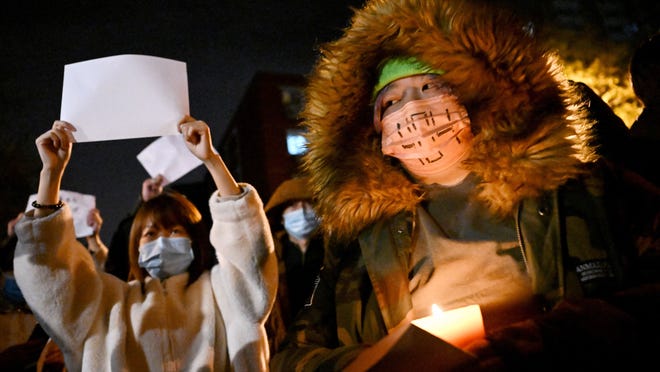Amy, a Fort Lee resident, watched with trepidation Monday as protests erupted in China over its zero-tolerance policy on COVID.
The demonstrations followed a fire in Urumqi, the capital of western China’s Xinjiang region, which killed 10 people. Many witnesses blamed the fire on strict COVID-19 restrictions that prevented residents of the large apartment building from safely evacuating.
Amy, who did not give her last name out of fear for the safety of her family, who still live in China, closely watched the demonstrations that erupted in the country in a rare act of defiance of the ruling Communist Party. When we spoke on Monday, Amy was tracking the Chinese-language social media platform WeChat as she tried to keep in regular contact with her relatives living in China’s Fujian province.
“Friends and family feel helpless, even if they don’t agree with the policy,” Amy said, explaining that many of her relatives are worried about the severe COVID-19 restrictions. “They are worried about the safety of the protesters and that they will be met with violence from the officials.”
In cities across China, thousands protested over the weekend and into Monday against the COVID-19 restrictions imposed and enforced by President Xi Jinping and his regime. Demonstrations are rare because China does not tolerate dissent in the same way that Western countries do – so rare, in fact, that many have compared them to the Tiananmen Square protests of 1989.
Related coverage from USA TODAY:Protesters angered by China’s blockade call for Xi to resign; Clashes of the crowd with the police in Shanghai
Asians in Greater New York:How did the fashionable boba tea become a symbol of liberal, upper-class Asians? | Mary Chao
On WeChat, Chinese citizens are sharing details with the wider Chinese diaspora about their frustrations with the quarantine, their displeasure with the ever-changing COVID-19 restrictions, and their fatigue and irritation — especially with daily testing, Amy said.
Others also noted challenges for Chinese Americans seeking to reunite with their families in the coming months — as well as frustration. Many have also been disappointed by China’s policies, which stand in stark contrast to the apparent international post-pandemic reality of fewer health restrictions. The ongoing FIFA World Cup in Qatar, which is being held with few if any restrictions, is also fueling Chinese frustration.
Chinese Americans in New Jersey are staying in touch with relatives during this uncertain time through WeChat, text messages and email. More than 110,000 people consider themselves Chinese in the Garden State. The Chinese-American community has Jersey bastions in places like Fort Lee, Parsippany and Edison. Asian Americans are the fastest growing group in the state, accounting for 10% of New Jersey’s population of 9 million, according to the 2020 census. New Jersey has the fifth largest population of Chinese Americans – trailing only California, New York, Hawaii and Texas.
Echoes of Tiananmen
Not since the Tiananmen protests of 1989 have so many Chinese risked arrest and personal safety by protesting government policies. Now nearly three years into the pandemic, China remains in near-lockdown mode as its citizens deal with the economic and mental health consequences.
“China itself is taking a dramatic approach,” said Demarest resident David Wen, 55. “People need to pay their bills.”
Weng immigrated to the United States 40 years ago from Hong Kong. His family is from Fujian province – and he still has cousins living there. While the United States has adopted fiscal stimulus plans to help its citizens financially during the COVID lockdown, China has not, Wen said. It’s hard to survive financially with the restrictions, he said.
Although the protests represent a loss of face for Xi – a devastating turn for the Chinese president – the protesters are unlikely to topple him. Xi has control over the Communist Party and the Chinese military, said Albert Chin, president of the Glen Rock-based Chinese Community Center of New Jersey.
“People are finally realizing that these controls are not right,” said Chin, 74, of Paramus. “Three years of COVID and people are sick of it.”
Chin is a Chinese-American with no close relatives in China, but he has been following the protests closely, worried that the government might crack down on the protesters.
Chin recalled the moment in Tiananmen Square when protests and demonstrations erupted in June 1989.
The demonstrations reached a climax on June 4, 1989, after the Chinese government dispersed the protesters and sent tanks to break their ranks. During these protests, college students and other Chinese citizens called for political and economic reforms. More than 30 years later, there are still no official estimates of the death toll from the crackdown, which is believed to range from several hundred to thousands.
The Chinese government does not tolerate dissent, Wen said. The ruling party exercises complete control over its people. Wen hopes the party will come to an agreement and loosen its rules somewhat.
“It’s wrong for the government to control people so much,” Wen said.
Mary Chao covers North Jersey’s Asian communities and real estate.
Email: mchao@northjersey.com
